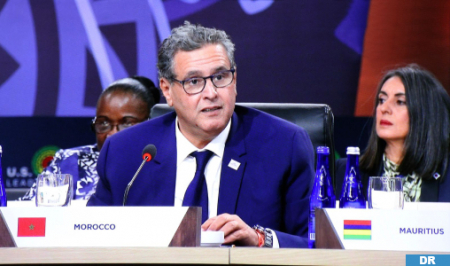Morocco Prioritizes Integrated, Inclusive U.S.-Morocco-Africa Partnership, Akhannouch Says
An integrated and inclusive partnership between Morocco, Africa and the United States is at the heart of the Kingdom’s priorities, said Thursday in Washington, the Head of Government, Aziz Akhannouch. In his speech at the U.S.-Africa Leaders Summit (December 13-15), Akhannouch stressed that Morocco, under the leadership of HM King Mohammed VI, is convinced of the importance of capitalizing on cooperative relations based on trust, with the aim of strengthening the inclusive and integrated partnership in the service of economies and in the interest of peoples. He noted, in this context, that the United States remains a “distinguished partner” of the African continent. The Head of Government has, in this context, indicated that Morocco puts its experience and expertise at the disposal of strengthening the economic and trade partnership between Africa and the United States. Referring to the progress made by Morocco, Akhannouch noted that Morocco has made great efforts to ensure its economic development, through the realization of large-scale infrastructure, including the Tanger-Med Port, the construction of 1,800 km of highways and the launch of a high-speed train linking two major economic centers, namely Tangier and Casablanca. In order to strengthen this development dynamic, the Kingdom has adopted a new investment charter that will consolidate the competitiveness and attractiveness of the country in various areas and promote the emergence of a new generation of economic actors and local and foreign investors, he said. And to emphasize that Morocco begins, under the leadership of HM King Mohammed VI, an unprecedented stage of its economic and social development in order to consolidate the foundations of the social state, and this through the realization of several large-scale projects relating in particular to the generalization of social protection to all citizens and the implementation of several important reforms in the health and education sectors. In this regard, the royal project to generalize social protection has allowed within a year to implement the unified system of compulsory basic health insurance for all Moroccan families, to generalize family allowances and to broaden the base of beneficiaries of pension schemes and compensation for loss of employment, said Akhannouch. Morocco is fully convinced that the achievement of the expected economic development is dependent on the respect of the environment, stressed the Head of Government, noting that as part of the enlightened vision of the Sovereign, the Kingdom occupies a pioneering position in the renewable energy sector for over 15 years. Today, Morocco provides 37% of its electricity needs from renewable energy and aims to increase this share to 52% by 2030, he said, adding that to achieve this goal, the country will open up to other sources of renewable energy, including green hydrogen. Akhannouch also noted that Africa has realized the importance of active integration into the global economy, recalling that the Heads of State have developed in 2013 “Agenda 2063” which allows the continent to distinguish itself in an integrated and sustainable manner, believing that this strategy is in tune with the challenges exacerbated in recent years by the pandemic of Covid-19 and its impact on the various economies of the world, especially African, as well as the war in Europe. This agenda puts the human element at the heart of its priorities with the concern of guaranteeing dignity to all citizens, added Mr. Akhannouch, stressing that these elements are at the center of the roadmap put in place in Morocco, in execution of the High Royal Directions, aiming at strengthening the pillars of the social State. The U.S.-Africa Leaders Summit brings together representatives of nearly fifty countries, civil society and the private sector of the African continent, in addition to officials from the U.S. administration and the African Union Commission. Participants in the three-day conclave are discussing issues ranging from the Covid-19 pandemic to climate change, democracy, governance, security, trade, investment, and developing partnerships between African countries and the United States.

